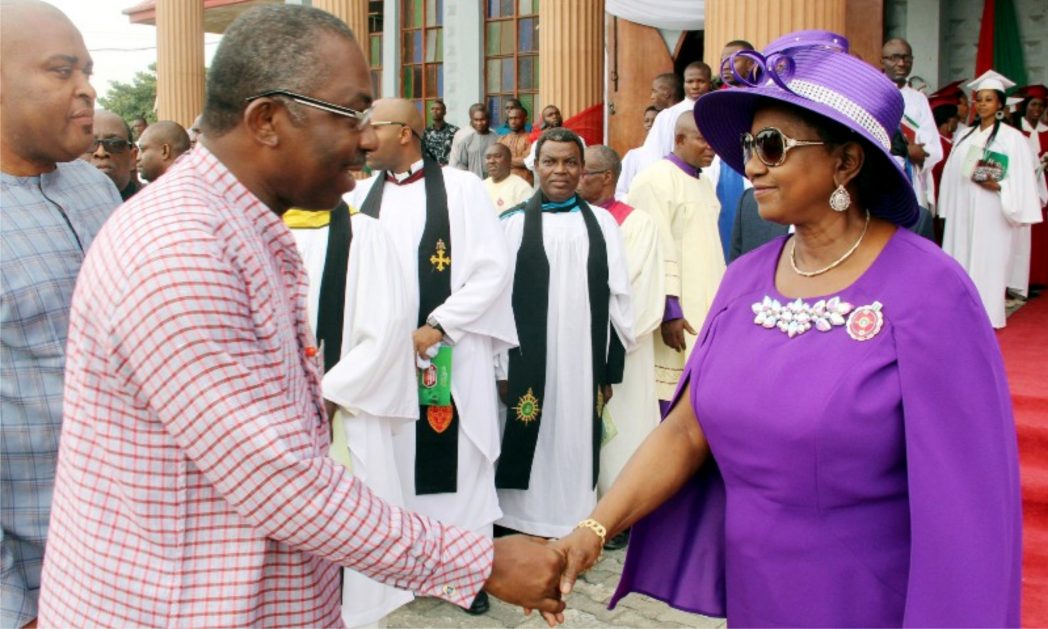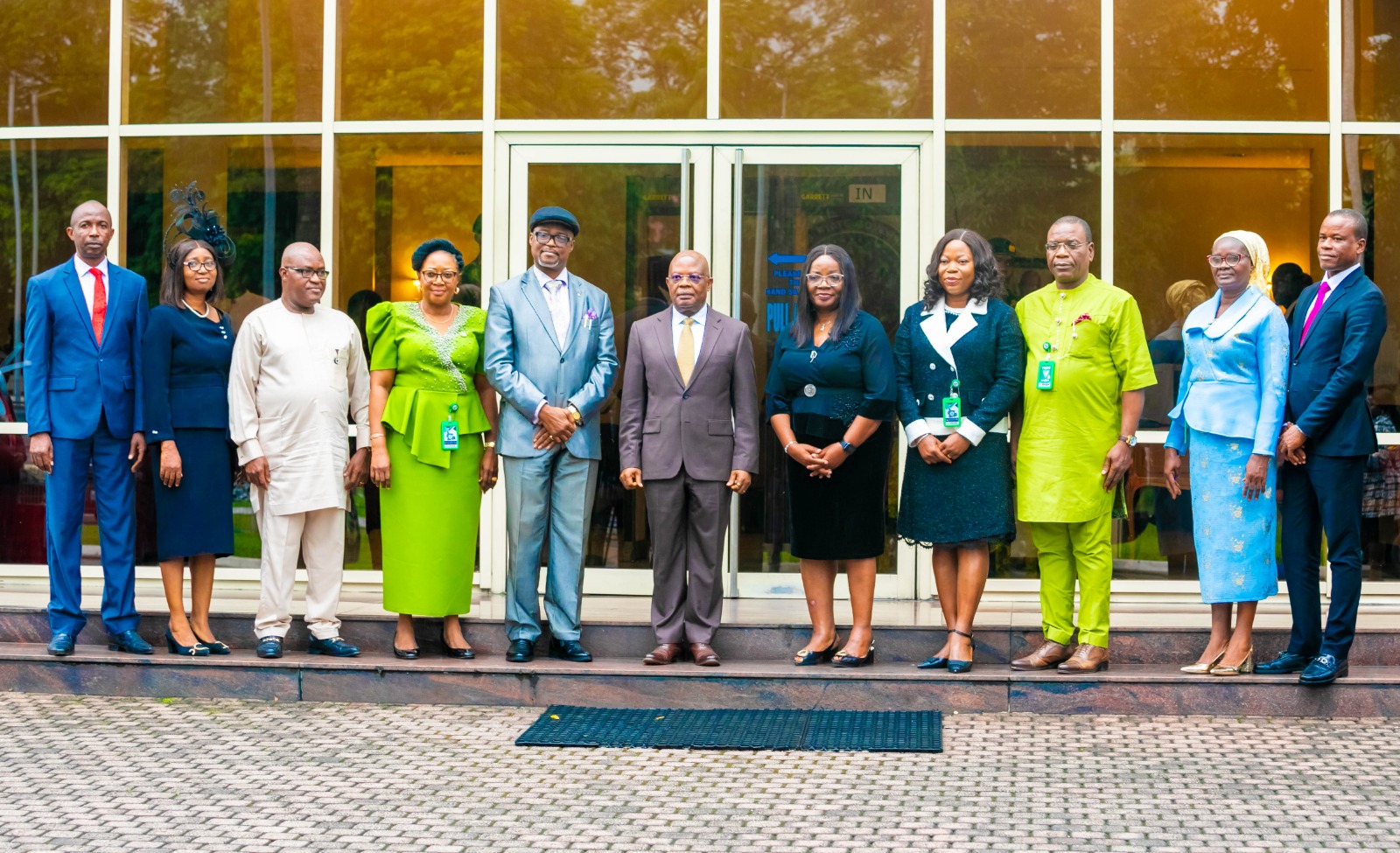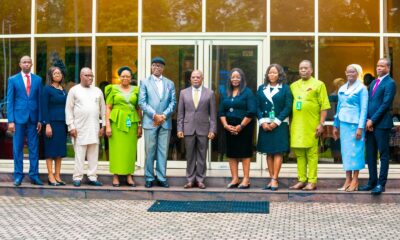Featured
2019 Elections: INEC Delists Rivers APC Candidates …Also Removes Zamfara APC Candidates

The Independent National Electoral Commission INEC has published the final list of Presidential and National Assembly candidates for next month’s general elections with the ruling All Progressives Congress (APC) missing out in Rivers and Zamfara States.
In the list signed by the INEC Secretary, Rose Orianran-Anthony, the presidential candidate of the Social Democratic Party SDP was also missing. There has been a legal tussle between Dr Donald Duke and Prof. Jerry Gana as to who is the right presidential candidate of the SDP, hence, INEC said it could not publish the particulars of either contender as the party has not forwarded it any name following a court order. The Federal High Court had barred the APC from fielding candidates in Rivers and Zamfara State following the inability of the ruling party to resolve its internal challenges and respect its own rules on the conduct of its primaries. ‘
Meanwhile, INEC Chairman, Prof. Mahmood Yakubu has asked Vice Chancellors of federal universities in Nigeria not to give the commission lecturers who are politically exposed. Yakubu spoke Thursday at the opening of a meeting with the Committee of Vice Chancellors CVC in Abuja to intimate them on the commission’s preparations for the general elections.
“As in previous elections, we have requested each University for a specified number of academic staff as contained in my letter to the Vice Chancellors.
Staff who are card carrying members or have participated in partisan politics should not be nominated. Similarly, those who may not be involved in partisan political activities but are known to have obvious political leanings should not be nominated.
The Commission will carefully scrutinise the list which must be submitted confidentially in the manner prescribed by Commission in my letter to the Vice Chancellors”, he said.
According to Yakubu, without the involvement of Nigeria’s tertiary institutions, especially the Universities, the Commission will find it extremely difficult to conduct credible elections. “At the polling unit level, the critical segment of election duty staff is drawn from products of our Universities and polytechnics involved in the mandatory National Youth Service Corps (NYSC) scheme.
For the various collation and declaration centres, the Commission draws the required Collation and Returning Officers from the academic staff of our Universities, including the Vice Chancellors who serve as Returning Officers for Governorship elections and Collation Officers for the Presidential elections.
It has been a happy collaboration which has further enhanced the transparency and credibility of the elections in Nigeria as well as public confidence in the process.
The Commission wishes to sustain and deepen this collaboration. “It is less than a month to the 2019 General Elections. On Saturday 16th February 2019, elections will hold in 470 constituencies nationwide made up of the Presidential, 190 Senatorial and 360 Federal Constituencies.
Two weeks later on Saturday 2nd March 2019, elections will hold in 1,088 constituencies made up of 29 Governorship elections, 991 State Constituencies and 68 Area Councils in the Federal Capital Territory. In summary, there are 1,553 Constituencies for which elections will held this year.
“The 2019 General Elections will involve the highest number of registered voters and a record number of political parties.
The final register of voters now stands at 84.004,084 while 91 political parties are contesting in different Constituencies nationwide. A total of 73 candidates are contesting in the Presidential election, 1,904 in the Senatorial and 4,680 in the Federal (House of Representatives) elections, making a total of 6,657 candidates contesting for 470 seats.
The final list of candidates for Governorship, State Assembly and FCT Area Council elections will be released in two weeks on Thursday 31st January 2019 in accordance with the Commission’s timetable and schedule of activities.
The commission, however, left vacant, the columns for the names and details of the Social Democratic Party (SDP) presidential candidate and his running mate, with remarks “court order’’ and “party yet to submit name of candidate.’’
It will be recalled both Prof. Jerry Gana, former Minister of Information and Donald Duke, former governor of Cross-River are engaged in a legal battle in the Court of Appeal as to who is the authentic candidate of the party.
Featured
Rivers A Strategic Hub for Nigeria’s Blue Economy -Ibas …Calls For Innovation-Driven Solutions

The Administrator of Rivers State, Vice Admiral (Rtd.) Ibok-Ete Ibas, has emphasized the need for innovation-driven strategies, strategic partnerships, and firm policy implementation to fully harness the vast potential of the blue economy.
Speaking during a courtesy visit by participants of Study Group 7 of the Executive Course 47 from the National Institute for Policy and Strategic Studies (NIPSS) at Government House, Port Harcourt, on Monday, Ibas highlighted the importance of diversifying Nigeria’s economy beyond oil by leveraging maritime resources to create jobs, enhance food security, strengthen climate resilience, and generate sustainable revenue.
The Administrator, according to a statement by his Senior Special Adviser on Media, Hector Igbikiowubo, noted that with coordinated efforts and innovative solutions, the blue economy could serve as a catalyst for inclusive growth, economic stability, and long-term environmental sustainability.
“It is estimated that a fully developed blue economy could generate over $296 million annually for Nigeria, spanning fisheries, shipping and logistics, marine tourism, offshore renewable energy, aquaculture, biotechnology, and coastal infrastructure,” he stated.
“We must transition from extractive practices to regenerative, inclusive, and innovation-driven solutions. This requires political cohesion, intergovernmental collaboration, robust infrastructure, and institutional capacity—all of which must be pursued with urgency and intentionality,” he added.
Ibas urged sub-national governments, particularly coastal states, to domesticate the national blue economy framework and develop tailored strategies that reflect their comparative advantages.
He stressed that such efforts must be guided by disciplined planning, regulation, and investment to maximize the sector’s potential.
Highlighting Rivers State’s pivotal role, the Administrator outlined its strategic advantages as follows:
•Nearly 30% of Nigeria’s total coastline (approximately 853km)
•Over 40% of Nigeria’s crude oil and gas output
•More than 33% of the country’s GDP and foreign exchange earnings
•416 of Nigeria’s 1,201 oil wells, many located in marine environments
•Two of Nigeria’s largest seaports, two oil refineries, and the Nigerian Liquefied Natural Gas (NLNG) terminal in Bonny Island—one of Africa’s most advanced gas facilities
Despite these opportunities, Ibas acknowledged challenges such as pollution, coastal erosion, illegal oil refining, unregulated fishing, inadequate infrastructure, and maritime insecurity.
He reaffirmed his administration’s commitment to institutional reforms, coastal zone management, and inter-agency collaboration to build a governance structure that supports a sustainable blue economy.
“Sustainability must be embedded in our development models from the outset, not as an afterthought. We are actively exploring partnerships in maritime education, aquaculture development, port modernization, and renewable ocean energy. We welcome knowledge-sharing engagements like this to refine our strategies and enhance implementation,” he said.
He urged the NIPSS delegation to ensure their findings translate into actionable recommendations that address the sector’s challenges.
Leader of the delegation, Vice Admiral A.A. Mustapha, explained that the visit aligns with their strategic institutional tour mandate on the 2025 theme: “Blue Economy and Sustainable Development in Nigeria: Issues, Challenges, and Opportunities.”
The group is engaging stakeholders to deepen understanding of policy efforts and institutional roles in advancing sustainable development through the blue economy.
Featured
INEC To Unveil New Party Registration Portal As Applications Hit 129

The Independent National Electoral Commission (INEC) has announced that it has now received a total of 129 applications from associations seeking registration as political parties.
The update was provided during the commission’s regular weekly meeting held in Abuja, yesterday.
According to a statement signed by the National Commissioner and Chairman of the Information and Voter Education Committee, Sam Olumekun, seven new applications were submitted within the past week, adding to the previous number.
“At its regular weekly meeting held today, Thursday 10th July 2025, the commission received a further update on additional requests from associations seeking registration as political parties.
“Since last week, seven more applications have been received, bringing the total number so far to 129. All the requests are being processed,” the commission stated.
The commission revealed the introduction of a new digital platform for political party registration. The platform is part of the Party Financial Reporting and Auditing System and aims to streamline the registration process.
Olumekun disclosed that final testing of the portal would be completed within the next week.
“INEC also plans to release comprehensive guidelines to help associations file their applications using the new system.
“Unlike the manual method used in previous registration, the Commission is introducing a political party registration portal, which is a module in our Party Financial Reporting and Auditing System.
“This will make the process faster and seamless. In the next week, the commission will conclude the final testing of the portal before deployment.
“Thereafter, the next step for associations that meet the requirements to proceed to the application stage will be announced. The commission will also issue guidelines to facilitate the filing of applications using the PFRAS,” the statement added.
In the meantime, the list of new associations that have submitted applications has been made available to the public on INEC’s website and other official platforms.
Featured
Tinubu Signs Four Tax Reform Bills Into Law …Says Nigeria Open For Business

President Bola Tinubu yesterday signed into law four tax reform bills aimed at transforming Nigeria’s fiscal and revenue framework.
The four bills include: the Nigeria Tax Bill, the Nigeria Tax Administration Bill, the Nigeria Revenue Service (Establishment) Bill, and the Joint Revenue Board (Establishment) Bill.
They were passed by the National Assembly after months of consultations with various interest groups and stakeholders.
The ceremony took place at the Presidential Villa, yesterday.
The ceremony was witnessed by the leadership of the National Assembly and some legislators, governors, ministers, and aides of the President.
The presidency had earlier stated that the laws would transform tax administration in the country, increase revenue generation, improve the business environment, and give a boost to domestic and foreign investments.
“When the new tax laws become operational, they are expected to significantly transform tax administration in the country, leading to increased revenue generation, improved business environment, and a boost in domestic and foreign investments,” Special Adviser to the President on Media, Bayo Onanuga said on Wednesday.
Before the signing of the four bills, President Tinubu had earlier yesterday, said the tax reform bills will reset Nigeria’s economic trajectory and simplify its complex fiscal landscape.
Announcing the development via his official X handle, yesterday, the President declared, “In a few hours, I will sign four landmark tax reform bills into law, ushering in a bold new era of economic governance in our country.”
Tinubu made a call to investors and citizens alike, saying, “Let the world know that Nigeria is open for business, and this time, everyone has a fair shot.”
He described the bills as not just technical adjustments but a direct intervention to ease burdens on struggling Nigerians.
“These reforms go beyond streamlining tax codes. They deliver the first major, pro-people tax cuts in a generation, targeted relief for low-income earners, small businesses, and families working hard to make ends meet,” Tinubu wrote.
According to the President, “They will unify our fragmented tax system, eliminate wasteful duplications, cut red tape, restore investor confidence, and entrench transparency and coordination at every level.”
He added that the long-standing burden of Nigeria’s tax structure had unfairly weighed down the vulnerable while enabling inefficiency.
The tax reforms, first introduced in October 2024, were part of Tinubu’s post-subsidy-removal recovery plan, aimed at expanding revenue without stifling productivity.
However, the bills faced turbulence at the National Assembly and amongst some state governors who rejected its passing in 2024.
At the NASS, the bills sparked heated debate, particularly around the revenue-sharing structure, which governors from the North opposed.
They warned that a shift toward derivation-based allocations, especially with VAT, could tilt fiscal balance in favour of southern states with stronger consumption bases.
After prolonged dialogue, the VAT rate remained at 7.5 per cent, and a new exemption was introduced to shield minimum wage earners from personal income tax.
By May 2025, the National Assembly passed the harmonised versions with broad support, driven in part by pressure from economic stakeholders and international observers who welcomed the clarity and efficiency the reforms promised.
In his tweet, Tinubu stressed that this is just the beginning of Nigeria’s tax evolution.
“We are laying the foundation for a tax regime that is fair, transparent, and fit for a modern, ambitious Nigeria.
“A tax regime that rewards enterprise, protects the vulnerable, and mobilises revenue without punishing productivity,” he stated.
He further acknowledged the contributions of the Presidential Fiscal Policy and Tax Reform Committee, the National Assembly, and Nigeria’s subnational governments.
The President added, “We are not just signing tax bills but rewriting the social contract.
“We are not there yet, but we are firmly on the road.”
-
News3 days ago
South-South Contributes N34trn To Nigeria’s Economy In 2024 – Institute
-

 Women3 days ago
Women3 days agoWhat To Know About Fufu, Loi Loi
-
Rivers3 days ago
ASALGA Community Debunks Reports On Ownership Of Land Its Settlements
-
Business3 days ago
NCDMB Promises Oil Industry Synergy With Safety Boots Firm
-
City Crime3 days ago
RSG Tasks Federal Government On Maternal Deaths
-
News3 days ago
NOA Set To Unveil National Values Charter — D-G
-

 Featured3 days ago
Featured3 days agoRivers A Strategic Hub for Nigeria’s Blue Economy -Ibas …Calls For Innovation-Driven Solutions
-

 Rivers3 days ago
Rivers3 days agoNDDC Inaugurates Ultra-Modern Market In Rivers Community

